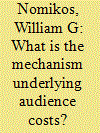|
|
|
Sort Order |
|
|
|
Items / Page
|
|
|
|
|
|
|
| Srl | Item |
| 1 |
ID:
174763


|
|
|
|
|
| Summary/Abstract |
This paper introduces the Robust Africa Deployments of Peacekeeping Operations (RADPKO) dataset, a new dataset of geocoded United Nations peacekeeping deployments. Drawing upon primary documents sourced directly from the UN covering 10 multidimensional peacekeeping operations from 1999 to 2018, RADPKO offers comprehensive monthly time-series data on UN peacekeeper deployment location by type, gender, and nationality. We describe the data collection in detail and discuss the cases and time periods missing from the data. We show that although the UN responds dynamically to conflict events in the field, deployments outside of population centres tend to be fairly homogeneous in regard to both nationality and gender. We use this data to empirically investigate the oft-posited link between deployment of peacekeepers and reductions in violence at the local level. We replicate and extend past studies but find that some previous findings are vulnerable to robustness checks, primarily due to data incompleteness. Our analysis suggests the importance of data collection transparency, management, and description to the quantitative study of peacekeeping. The data, updated annually, provides new opportunities for scholar conducting micro-level research on peacekeeping, conflict, development, governances, and related topics across subfields in Political science.
|
|
|
|
|
|
|
|
|
|
|
|
|
|
|
|
| 2 |
ID:
127895


|
|
|
| 3 |
ID:
167283


|
|
|
|
|
| Summary/Abstract |
Audience cost theory posits that concern over the nation’s reputation pushes voters to sanction leaders who make empty threats because they tarnish the nation’s honor. We question the empirical support for that theory. We show that survey vignettes in the previous experimental literature conflate audience costs generated by inconsistency and belligerence with approval losses arising from the perception that the leader is incompetent. These ‘incompetence costs’ are due to leaders not achieving audiences’ preferred outcomes. Our article contributes to the literature on audience costs by disentangling inconsistency and belligerence costs from incompetence costs, which we find are the larger component of audience costs. We also make a methodological contribution: we show that experimental designs in previous studies cannot test the different mechanisms; that previous estimates of audience costs are biased because treatments affect respondents’ beliefs about the likely outcome of policy actions; and we suggest a new experimental framework to estimate audience costs. Our results are consistent with arguments that audiences care more about policy outcomes than about leaders’ inconsistency or belligerence during a crisis.
|
|
|
|
|
|
|
|
|
|
|
|
|
|
|
|
| 4 |
ID:
178683


|
|
|
|
|
| Summary/Abstract |
Why do former belligerents institutionalize power-sharing arrangements after a civil war ends? The choice of power-sharing institutions shapes the nature of governance in many post-conflict settings. A better understanding of how belligerents come to choose institutionalized forms of power-sharing would thus help us explain how belligerents come to make a seemingly simple institutional choice that may have immense consequences. Existing scholarship emphasizes the nature of the conflict preceding negotiations, international actors, or state institutional capacity as critical factors for determining whether former belligerents will agree to share power or not. Yet these accounts overlook the importance of political considerations between and within ethnic groups. This article argues that elites create power-sharing institutions when the most significant threat to their political power comes from an outside group as opposed to from within their own group. That is, forward-looking and power-minded leaders of former belligerents push for the type of power-sharing at the negotiating table that affords them the greatest opportunity to influence country-level politics after the conflict has concluded in full. For elites facing competition from outside, this means securing power-sharing through institutional rules and guidelines in the settlement of the civil war to ensure that they are included in the governance of the state. By contrast, for elites fearing in-group rivals, complex governance institutions are at best unnecessary and, at worst, a significant concession to weaker opponents. I test the argument with a cross-national analysis of an original dataset of 186 power-sharing negotiations from 1945–2011. The empirical analysis suggests that elites are most likely to institutionalize power-sharing when no single ethnic group dominates politics and when most ethnic groups are unified. The quantitative analysis is complemented with illustrative examples from cases of power-sharing negotiations that offer insight into the proposed theoretical mechanisms.
|
|
|
|
|
|
|
|
|
|
|
|
|
|
|
|
|
|
|
|
|